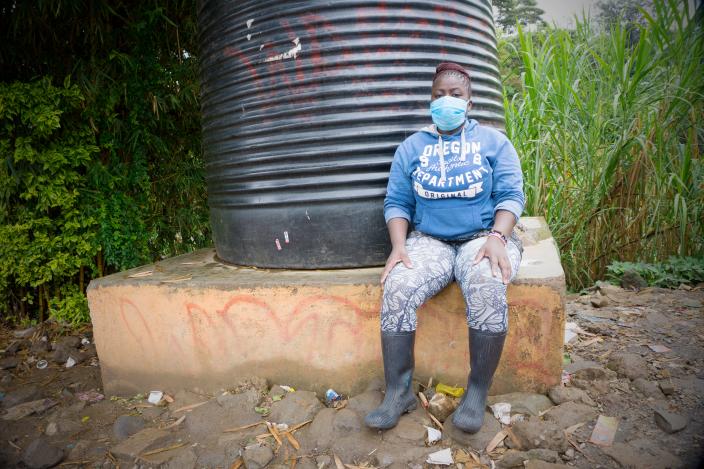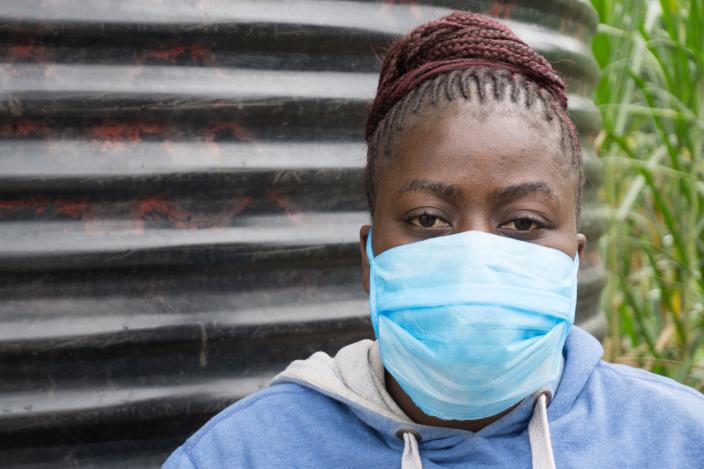Emmaculate Onyango is a 25-year-old mother of three children who also is the main breadwinner for a household of 7 people.
Onyango used to juggle a series of odd jobs to make a living before the Covid-19 pandemic. Her primary source of income was washing clothes for wealthy clients in Nairobi, and she would also make and sell beaded jewellery. In a day, Onyango said she would make between 500 KES per day before the coronavirus pandemic. Since Covid-19 struck Onyango has been taking home an average of 1000 KES per week – barely enough to meet the needs of her household.

Emmaculate Onyango Photo By Asha Jaffar / Oxfam in Kenya
“Before coronavirus, we used to eat three meals per day. These days we eat one or two meals each day” says Onyango. “Food prices have risen a lot. Flour used to cost 100 KES, now it’s 130 KES.”
The mandatory curfew imposed by the Government of Kenya to curb the spread of Covid-19 has also made it difficult for Onyango to make a living. She used to do some of her jobs after 9 pm before the pandemic - an act that is now punishable with a fine of up to KSh 10,000, imprisonment for up to three months, or both.
When they are at wit's end, Onyango and her family have taken to borrowing maize from sympathetic shop owners in her neighbourhood, so that her family can at least make porridge to get through the day.

Emmaculate Onyango Photo By Asha Jaffar / Oxfam in Kenya
In April, Onyango received KES 5641.5 from Consortium partners Oxfam in Kenya, The Kenya Red Cross Society, Concern Worldwide, ACTED, IMPACT. (In April) Onyango was among 625 pilot cash transfer recipient households who received a total of KES 3,469,215 with the goal of covering 50% of their basic needs.
“The money we received helped us to pay rent, and buy flour, greens, soap, maize, and buy water in advance weekly. We could not afford soap before we received the money. We relied on soap donations from other organizations like SHOFCO” says Onyango.
In informal settlements like Kibera, poor families like Onyango’s end-up paying 172% more for water compared with affluent high-income families in areas like Lavington. Women and girls are particularly affected by this disparity as they need water for personal hygiene and are often expected to walk long distances to fetch water for their households. Thereby exposing themselves to the risk of contracting Covid-19 around the crowded public water points, and the risk of being assaulted as they travel to look for water.
Onyango says she currently pays 5 KSh for a 20-litre jerry can of water, and her family uses about 8 jerry cans per day for their drinking and hygiene needs.
The money she received from the NGO consortium helped Onyango pay in advance for a much cheaper weekly subscription option to their community water provider, saving the family as much as 180 KES per week. Onyango says she has also been able to buy food early and be indoors before the mandatory curfew and risking encounters with police.
Onyango still fears contracting Covid-19. Her primary line of work, washing clothes, involves interacting with many people in different areas of Nairobi, but she cannot stay home – she must support her household. She is still unable to afford her bills, such as electricity, and she has been paying her rent in portions to keep her landlord from evicting her family.
Sadly, Onyango’s younger brother who is also part of her household is HIV positive. His food is more expensive because he is forced to maintain a healthy diet to manage his condition, and he is also in considerable danger of suffering Covid-19’s most severe effects should he contract the disease - including death.
Onyango appeals to NGOs and the Kenyan Government to expand support to informal settlement residents in Kenya with their rent, food and basic necessities during the Covid-19 pandemic.
Thanks to a €5 Million (KES 630,491,100) grant funded by the European Union, the successful cash-transfer pilot in which Onyango was enrolled has been recently expanded to cover an estimated 80,000 vulnerable Kenyans in Nairobi informal settlements for three months.
With the help of EU funding, NGOs Oxfam in Kenya, The Kenya Red Cross Society, Concern Worldwide, ACTED, IMPACT, CREAW and the Wangu Kanja Foundation have transferred Ksh KES 91,060,280.00 to date to 11,328 vulnerable families (an estimated 45,312 total people) in Nairobi informal settlements to help them afford basic necessities during the Covid-19 pandemic. Over the course of three months, the NGO consortium aims to transfer an 398,748,899 Ksh to 17,390 families (an estimated 69,560 people).
